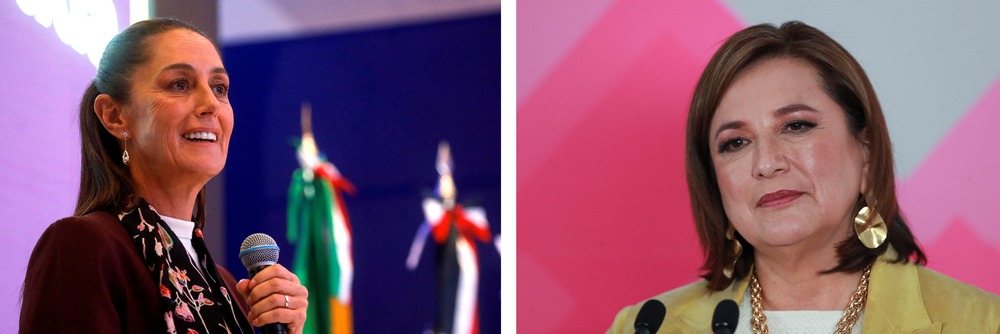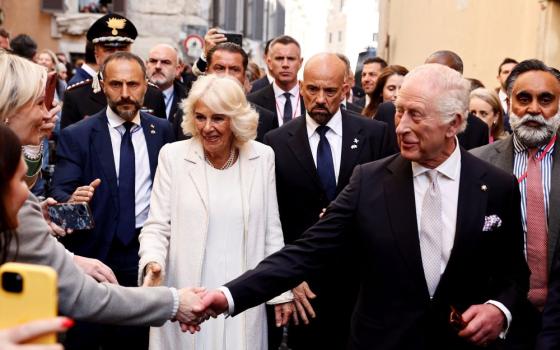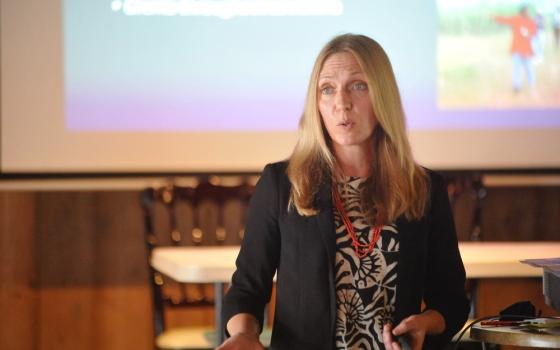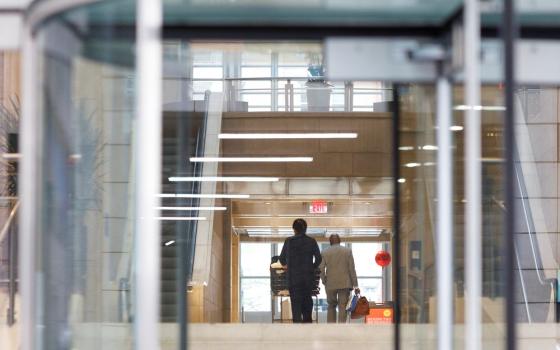
Presidential candidates Claudia Sheinbaum, of Mexico's ruling party, and opposition hopeful Xóchitl Gálvez are pictured in a combination photo. The two candidates met with the bishops April 10, 2024, during the conference's semiannual plenary assembly near Mexico City. (OSV News/Raquel Cunha/Henry Romero, Reuters)
The Mexican bishops' conference met with the two main presidential candidates less than a month after the front-runner said she disagreed with the "pessimistic" diagnosis of Mexico's security situation in a church proposal for pacifying the country.
Claudia Sheinbaum, who leads all polls for the June 2 election, pledged at the time to continue dialogue with the Catholic groups implementing the National Agenda for Peace — an initiative undertaken by the bishops' conference, the Society of Jesus and the Conference of Major Superiors of Religious of Mexico.
"We recognize Pope Francis' humanist thinking and the labor done by the bishops to attend to the causes that generate violence," Sheinbaum, candidate for the ruling Morena party, said on X (formerly Twitter) after the April 10 meeting. "Respecting religious freedom is a conviction of our movement."
Sheinbaum and Xóchitl Gálvez, candidate for a three-party coalition, met with the bishops April 10 during the conference's semiannual plenary assembly near Mexico City. Jorge Álvarez Máynez, candidate with the small Citizen Movement party, joined the bishops the following day.
"Only through dialogue can we move ahead as a society," Gálvez said on X after meeting the bishops. "I'm convinced that churches play a fundamental role in the construction of peace and the social fabric."
For their part, the bishops' conference reiterated its call for pursuing peace in Mexico, where conflicts between drug cartels and criminal activity claimed more than 30,000 lives for each of the past six years and thousands more disappear annually.
"We continue to see that violence causes the ravages of pain, suffering and death everywhere. With sadness we perceive that impunity, corruption, injustice, poverty and constant migration are social realities present in our communities," the conference said in an April 11 statement.
"In the face of the upcoming elections, despite the efforts of many political and social actors … there is no shortage of political clientelism, lies, deception and manipulation of the masses. However, we also note that there are many Mexicans who long for a more united, safer, fairer, freer and more developed Mexico," the bishops said in the statement signed by the president of Mexico's bishops' conference, Archbishop Rogelio Cabrera López of Monterrey, and its secretary-general, Bishop Ramón Castro Castro of Cuernavaca.
The conference's secretary-general later called on President Andrés Manuel López Obrador to reconsider his stated security policy of "hugs, not bullets," saying, "It's not giving us the results that we wanted."
"We have already said it, that it should be reviewed to the extent possible, because peace in Mexico is wounded … and we need to rebuild it," Castro said.
Advertisement
López Obrador previously blasted the bishops for calling for a security policy review after two Jesuits were shot dead in June 2022, while sheltering a man in their parish in northern Chihuahua state. López Obrador is constitutionally prohibited from seeking reelection.
The murders prompted Catholic leaders to speak more urgently on security matters and convene forums for constructing peace and repairing the social fabric.
Those forums — the National Dialogue for Peace — informed the National Agenda for Peace, which the church is now working to implement on the local level. Local candidates also are being invited to sign the agenda and engage in dialogue, starting with the aspirants for Mexico City mayor on April 15.
"We continue sustaining the diagnosis," Jesuit Father Jorge Atilano, director of the National Dialogue for Peace, told OSV News. "(We're) opening dialogues so that we can build viable proposals that help improve the country's peace conditions."





